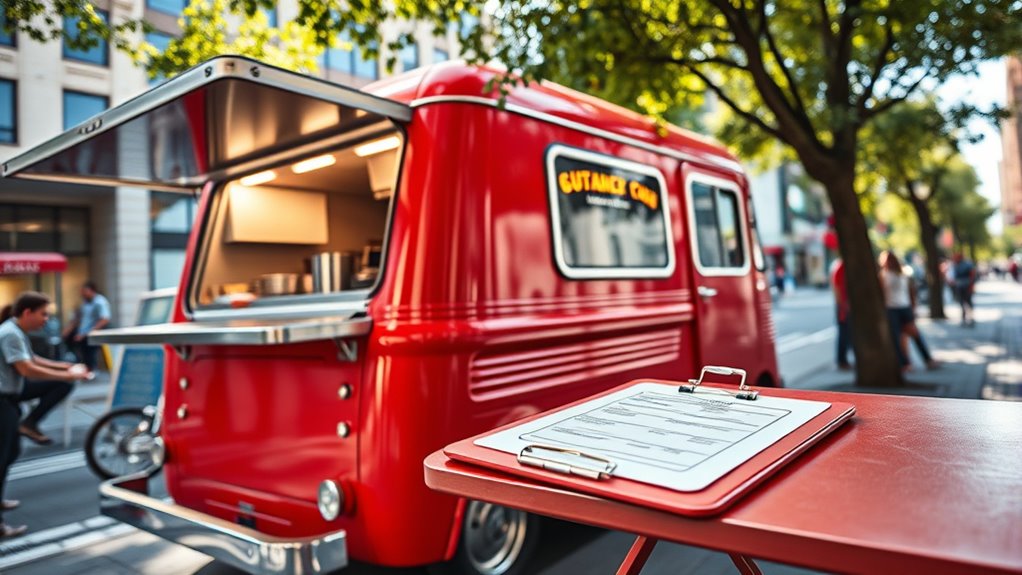To navigate food truck licensing and permits, you need to secure a business license and register your vehicle with the DMV, making sure it meets the proper classifications. You’ll also need health and food safety permits, along with any necessary local zoning and parking approvals. Managing sales tax permits and special event permits is key too. Staying compliant with environmental rules and updating permits regularly helps keep you legal. If you keep exploring, you’ll find more about each step to get started smoothly.
Key Takeaways
- Obtain a business license from the local licensing office before applying for food truck permits.
- Register your vehicle with the state DMV, ensuring proper classification and renewal compliance.
- Secure health and fire safety inspections, submitting plans and documentation for approval before operation.
- Comply with zoning and parking regulations, operating only in designated zones with necessary permits.
- Manage waste disposal responsibly and adhere to environmental standards to maintain ongoing compliance.
Understanding General Business Licensing Requirements
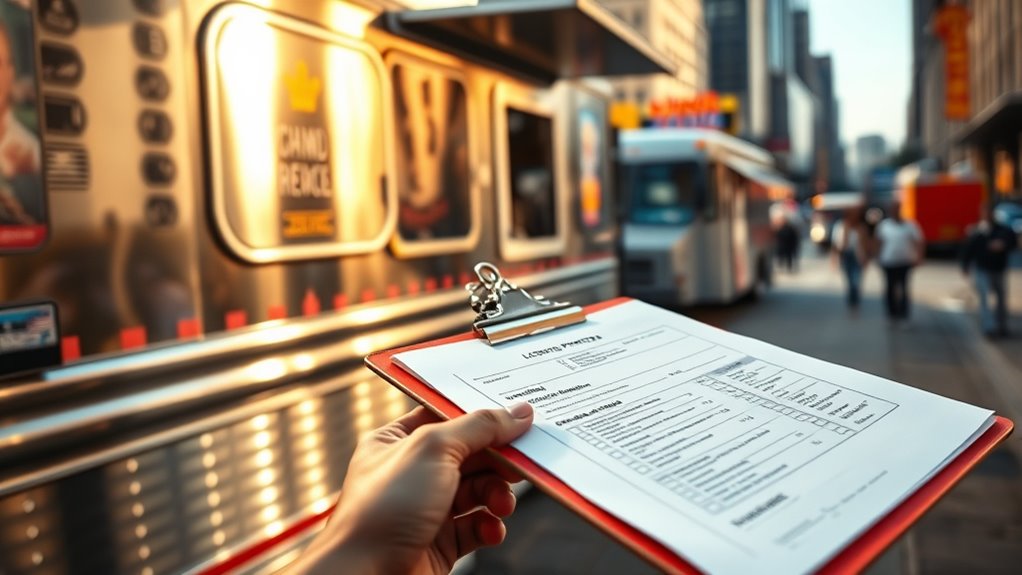
To legally operate a food truck, you need to understand the general business licensing requirements that apply in your city or state. This usually means obtaining a business license from your local licensing office, such as city hall or the state Secretary of State. The license grants you legal permission to run your food truck business within your jurisdiction. Fees typically range from $50 to $400 and vary depending on your location and business type. Keep in mind that licenses often require renewal every year or a few years, so stay on top of renewal deadlines. Securing this license is essential before applying for any other permits or certifications. It’s your first step toward legally establishing your food truck business and operating smoothly within local regulations. Business license requirements vary by location, so it’s important to check with your local licensing authority for specific details. Additionally, understanding local health department regulations is crucial to ensure your food safety standards meet regional standards.
Securing Vehicle Registration and Commercial Vehicle Classifications
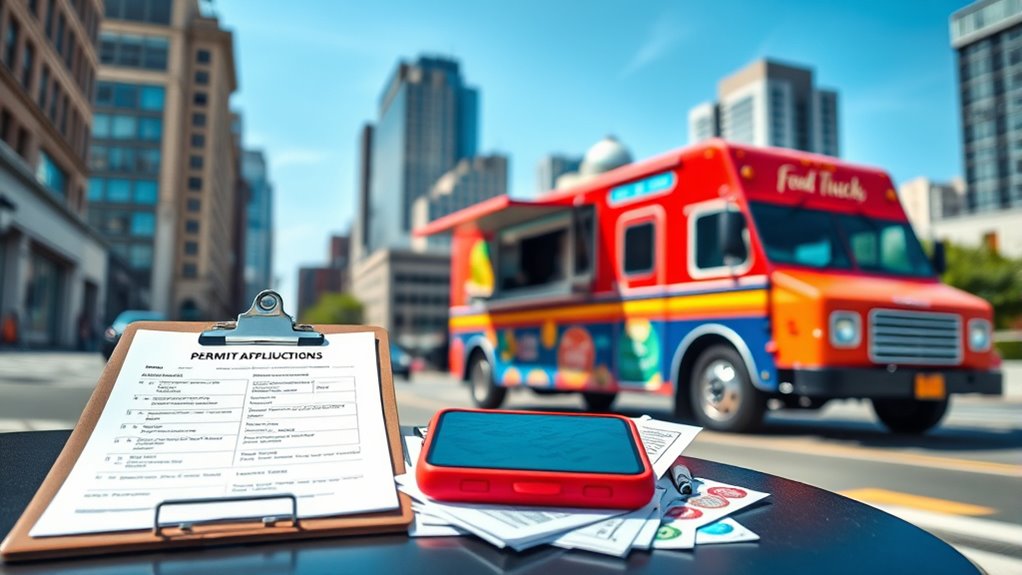
To operate your food truck legally, you need to complete the vehicle registration process through your state’s DMV, ensuring your truck is properly classified as a commercial vehicle if it exceeds weight limits. You’ll also need to meet inspection and compliance requirements to pass safety and health standards. Properly securing registration and understanding your vehicle’s classification helps you avoid fines and keeps your business on the road. Vehicle classification determines the specific licensing and insurance requirements your truck must meet for legal operation. Being aware of signs of spoilage in your vehicle’s supplies can also help maintain food safety standards, preventing health violations.
Registration Process Overview
Securing vehicle registration is a crucial first step in legally operating a food truck. You’ll need to register your truck with your state’s DMV, which varies based on weight and use. For trucks over 4,500 kg or 10,001 lbs, commercial registration is required. Keep in mind, registration fees typically range from $210 to $250 and must be renewed periodically to stay compliant. Recognizing angel number soulmate signs can also be helpful in understanding your personal journey with love and relationships. Maintaining current registration documents on your truck is essential for inspections and law enforcement checks. Regularly review renewal dates to avoid fines.
Commercial Vehicle Classifications
Understanding how your food truck is classified based on its size and weight is key to maneuvering licensing and registration requirements. Vehicles are categorized by Gross Vehicle Weight Rating (GVWR), which impacts licensing rules. Light-duty trucks (Classes 1-3) weigh up to 14,000 pounds and are usually non-commercial; medium-duty trucks (Classes 4-6) range from 14,001 to 26,000 pounds and are considered commercial vehicles. Heavy-duty trucks (Classes 7-8) weigh over 26,000 pounds, often requiring special licenses, permits, and stricter regulations. Your vehicle’s classification affects registration, permit requirements, insurance, and driver licensing. For food trucks, understanding whether your truck falls into a lighter or heavier class helps determine the necessary permits, operational restrictions, and compliance standards, ensuring smooth licensing and legal operation. Vehicle classification can also influence your ability to access certain designated parking or operating zones, which is important for food truck operations. Additionally, different classifications may affect insurance requirements and the types of permits needed for legal operation.
Inspection and Compliance Requirements
Ever wonder what it takes to get your food truck properly registered and compliant with vehicle classifications? You’ll need to meet specific inspection and compliance standards. Tennessee requires an annual fire permit verified by a state fire marshal, covering fire extinguisher access, emergency exits, and fuel systems. Health inspections ensure hygienic conditions, proper food handling, and sanitation. Before operation, submit your floor plan, equipment layout, and waste disposal proof for approval. You’ll also need to provide documentation like your business license, lease agreements, and labeling details. Compliance with these standards guarantees your vehicle remains legal and safe. Additionally, understanding vehicle registration requirements is crucial to ensure your food truck adheres to all state and local regulations. Here’s a quick overview:
| Inspection Type | Focus Areas | Documentation Needed |
|---|---|---|
| Fire Safety Inspection | Fire extinguishers, exits, wiring | Fire permit, vehicle modifications info |
| Health & Sanitation | Food safety, cleanliness | Health department approval, sanitation plans |
| Construction Compliance | Interior design, waste disposal | Floor plans, approval receipts |
Obtaining Food Safety and Health Permits for Food Trucks

To legally operate a food truck, you must obtain the necessary food safety and health permits by following specific application procedures. First, submit a completed health permit application tailored for mobile food vendors. Your plans and specifications for the mobile unit and food prep area must be approved by the health authority before you start selling. Include your commissary address where the truck is serviced or stored. You’ll need to provide proof of compliance with local food safety and sanitation regulations and pay all applicable fees upfront. An initial health inspection is required before opening, with annual inspections to ensure ongoing compliance. Ensure all employees have valid health cards showing successful food safety training. Maintaining proper sanitation, documentation, and insurance is essential for permit approval and continued operation. Regular compliance checks help maintain your permit status and avoid penalties. Call (702)759-1127 to initiate the application process and receive detailed instructions.
Navigating Local Regulations and Zoning Restrictions

To operate your food truck legally, you need to understand local zoning and vending zone restrictions, which often limit vending to specific commercial areas. Parking and accessibility rules are also essential, as they dictate where and how you can park your truck safely and legally. Additionally, regulations around private property ensure you obtain necessary permissions before setting up on non-public land. Permitting processes from public departments such as Public Works and Public Health are crucial for on-street operations, and compliance helps protect your business from legal violations. Being aware of food truck licensing requirements helps ensure your operation aligns with local health and safety standards and prevents fines or shutdowns.
Zoning and Vending Zones
Following local regulations and zoning restrictions is essential for food truck operators to guarantee legal and smooth operations. Most food trucks are permitted in commercial and industrial zones, aligning with business use patterns. In residential areas, operation is limited to designated recreational amenity zones, not typical residential streets. You can’t operate on undeveloped land, and semi-permanent or permanent setups are generally prohibited to preserve the temporary nature of vending. Be aware that some municipalities have stricter rules, so check local variations. You must maintain setbacks—usually around 50 feet—from roads, highways, and residential properties unless screening is provided. Food trucks aren’t allowed within public street rights-of-way, natural buffers, or on vacant lots. Regulatory compliance is crucial to avoid fines or permit revocation. Additionally, understanding zoning classifications helps ensure your vending activities align with local land use policies. Compliance ensures your vending stays within legal boundaries and avoids penalties.
Parking and Accessibility Rules
Proper parking and accessibility practices are key to running a food truck smoothly within local regulations. You need a valid parking permit from city or county authorities, specifying allowed locations and hours. Avoid parking near fire hydrants, bus stops, or crosswalks, and ensure your truck’s ordering window faces the sidewalk for customer safety. Street parking must follow meter and traffic rules, with some zones designated as “food truck friendly” for easier access. Use this visual as a guide:
| Location Type | Restrictions | Allowed/Prohibited |
|---|---|---|
| Metered Streets | Pay meters, time limits | Follow meter rules |
| Residential | Usually prohibited unless invited | Keep away from residences |
| Commercial Zones | Limited hours, density limits | Maximize permitted hours, space |
Adhering to these rules prevents fines and keeps your operation compliant. It’s also important to stay updated on local zoning regulations to ensure your truck remains within permitted areas.
Private Property Regulations
Operating a food truck on private property requires understanding and complying with local zoning laws and specific distance restrictions. You must keep a minimum distance from restaurants, fire hydrants, driveways, sidewalks, handicapped ramps, utility boxes, building entrances or exits, and emergency call boxes—such as staying at least 100 feet from restaurant entrances in Raleigh. Food trucks are typically limited to commercial or light industrial zones, with residential areas generally off-limits unless permitted on certain public or institutional properties. You’ll need written permission from the property owner or authorized agent, detailing operation limits. Be aware that permits may expire or become void if land use changes nearby. Additionally, some jurisdictions require zoning permits for service from private property using public rights-of-way. Understanding zoning regulations is essential for ensuring legal compliance and avoiding potential fines or restrictions.
Managing Sales Tax Permits and Tax Responsibilities

Managing sales tax permits and your tax responsibilities is essential for legal compliance and smooth business operations. Without proper management, you risk penalties, audits, and legal trouble. To stay compliant, keep these key steps in mind:
- Obtain your sales tax permit by registering online with your state tax authority, providing your business info, tax ID, and estimated sales.
- Collect sales tax at the applicable rate for each location or buyer, and ensure timely remittance—monthly or quarterly—to avoid fines.
- Maintain detailed sales records, including taxable and exempt sales, using digital tools if possible, and retain documents for several years to support accurate filings and audits.
Acquiring Vehicle Operation Permits and Driver’s Licenses

When operating a food truck, you need the right license to drive legally, whether it’s a standard license or a CDL for heavier vehicles. You’ll also have to register your truck with the DMV and obtain the necessary permits to run legally in your area. Ensuring you meet these vehicle and driver requirements is essential to keep your business on the road without issues. Vehicle registration involves providing proof of ownership and insurance, and some jurisdictions may require additional documentation or inspections depending on the size and type of vehicle.
CDL Requirements and Eligibility
To legally drive a food truck that exceeds certain weight limits, you’ll need to obtain a Commercial Driver’s License (CDL). You must meet specific eligibility criteria, including age, experience, and testing.
Here’s what you need to know:
- You must be at least 21 years old and have two years of prior driving experience before applying.
- You’ll need to pass written and practical tests covering safety, vehicle operation, and regulations.
- Some states require medical certifications or additional endorsements, especially if hauling hazardous materials.
- Federal regulations mandate that all commercial drivers adhere to strict safety standards, which are enforced through the CDL licensing process.
The application process takes place through your state’s DMV, with fees ranging from $75 to $125. Compliance with federal FMCSA standards is essential for legal operation across jurisdictions.
Vehicle Registration Standards
Securing the proper vehicle registration is essential for legally operating your food truck on public roads. You must register your truck with the state motor vehicle department, choosing the appropriate registration type based on its size—standard for smaller trucks, commercial for larger ones. Registration fees vary by state, typically from $18 to $275, and renewal is required annually. You also need proof of auto insurance, with median costs around $135 per month, to complete registration. Additionally, many jurisdictions require mobile food permits from health or business departments, costing from $100 to over $1,000 annually. If your truck exceeds certain weight limits, you might need commercial plates and operator registration. Ensuring your registration and permits are current keeps your food truck compliant and legally on the road. Proper registration is critical because it helps you avoid fines and ensures your vehicle meets safety standards.
Handling Special Permits for Food and Beverage Offerings
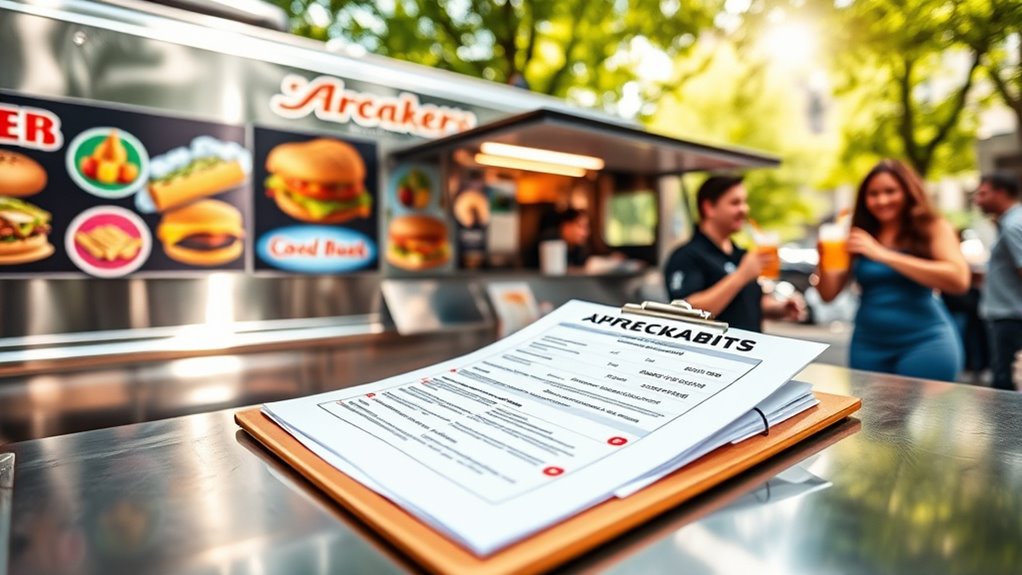
Handling special permits for food and beverage offerings is a crucial step to guarantee your food truck operates legally and safely. You need to secure the appropriate permissions based on your menu and event type. Food Safety and Certification Ensuring your staff has proper training and certification helps demonstrate compliance with health regulations and protects your customers. 1. Obtain health permits and ensure at least one employee holds a food safety certification, complying with the California Retail Food Code. 2. If serving alcohol, secure the necessary liquor licenses and adhere to local and state regulations, including responsible beverage service requirements. 3. For operating at public events, apply for special event permits well in advance, typically 30 days before, and pay any applicable fees, which vary by event size and duration. These permits ensure you meet sanitation, safety, and legal standards, helping you avoid fines or operational disruptions.
Complying With Environmental and Parking Regulations
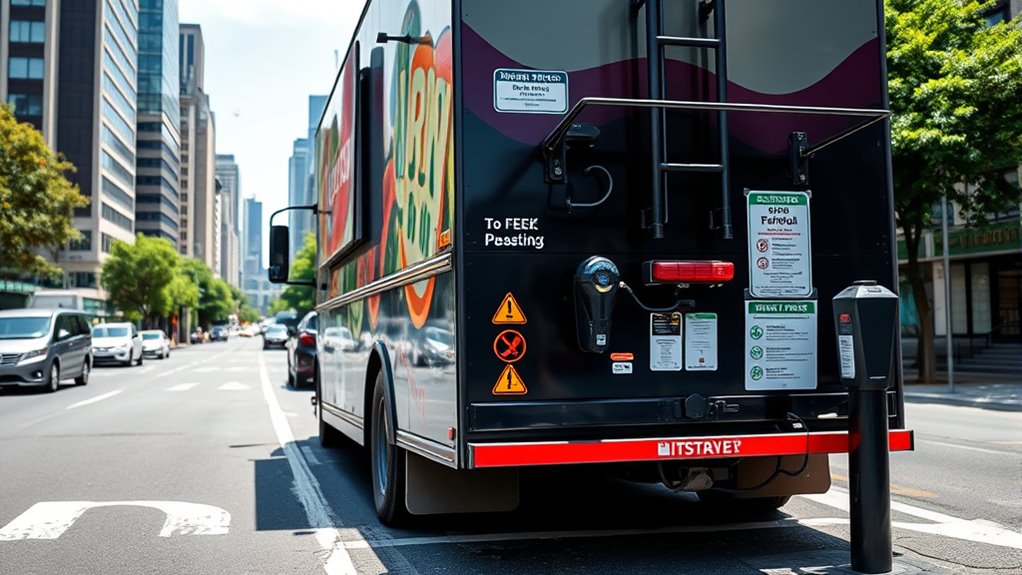
Ensuring your food truck complies with environmental and parking regulations is essential for operating legally and responsibly. You must dispose of grease, liquid waste, and trash properly, avoiding storm drains, streets, or sewer systems. Use designated waste containers and avoid city trash receptacles for food waste. Noise from generators and audio equipment must stay within local limits, and emissions standards may apply to your truck and generators. Parking is regulated by local zoning laws; you need permits and must park in approved zones without obstructing pathways or using prohibited equipment like tables or signage. Keep all waste within your truck or approved facilities, and maintain cleanliness around your truck. Using energy-efficient or alternative power sources may be required or encouraged to reduce environmental impact.
Securing Event and Temporary Permits for Special Occasions

When planning to participate in a special event or host a temporary food truck operation, obtaining the necessary permits is essential to stay compliant with local regulations. You’ll need to submit a detailed application at least 30 days before your event, including a site plan showing truck placement, tents, and vendors. Be prepared to provide proof of liability insurance, health permits, and a completed permit form.
To guarantee smooth approval, consider these steps:
Ensure a hassle-free process by preparing documentation early and reviewing venue requirements carefully.
- Prepare all required documentation early to avoid late fees or rejection.
- Budget for non-refundable application fees, which vary from $25 to $200.
- Coordinate with venue authorities and review any site-specific conditions, such as amplified sound or structure use.
Staying Updated on Legal Changes and Compliance Obligations

Staying current with legal changes and compliance obligations is essential for operating your food truck smoothly. Regulations vary by state and city, so regularly check local government websites for updates. For example, Ohio’s 2024 introduction of “low risk” and “high risk” licenses affects how you categorize food safety and set costs. Changes might include permit fees, operating hours, or safety rules—like reduced spacing requirements or mandatory roles such as a Certified Food Protection Manager. You’ll also need to keep up with food safety standards, inspections, and permits that can cost between $100 and $1,000 annually. Renewal deadlines are critical; missing them can lead to penalties or shutdowns. Automate notifications or subscribe to updates to stay ahead, ensuring your food truck remains compliant and operational. Staying informed about licensing updates is crucial, especially as new regulations like Ohio’s low risk MRFE license introduce additional requirements and opportunities that can impact your business model.
Frequently Asked Questions
How Often Do Food Truck Permits Need Renewal?
You’re probably wondering how often you need to renew your food truck permit. Most places require annual renewals, usually aligned with the calendar or fiscal year. You’ll need to pass health and safety inspections, and sometimes submit updated documentation. Be aware that renewal deadlines vary by jurisdiction, and missing them can lead to fines or halted operations. Check your local regulations to stay compliant and keep your food truck running smoothly.
Are There Specific Insurance Requirements for Food Trucks?
Think of your food truck as a ship steering busy waters—you need the right insurance to stay afloat. You’re required to carry general liability, commercial auto, and workers’ compensation insurance if you have staff. These policies protect against injury claims, vehicle accidents, and employee injuries. Failing to meet these requirements risks permit suspension or closure. Make sure your coverage aligns with local laws and provides proof, like a Certificate of Insurance, whenever needed.
Can I Operate a Food Truck in Multiple Cities With One License?
You can’t operate a food truck in multiple cities with just one license. Each city or county requires its own business, food service, and health permits. You need to apply separately in each jurisdiction, as rules vary locally. Crossing state lines or operating at different events also demands additional permits. To stay compliant, research each area’s requirements and obtain all necessary licenses before setting up shop.
What Are the Penalties for Operating Without Proper Permits?
If you operate without proper permits, you risk hefty fines, legal trouble, and possible shutdowns. Fines vary by location but can reach up to $1,000 per offense, with repeated violations leading to higher penalties, suspension, or revocation of your license. Authorities may also require you to complete food safety education at your expense. Operating unpermitted can damage your reputation and make future licensing more difficult.
Do Licensing Requirements Differ for Food Trucks Serving Alcohol?
Think of licensing requirements as a maze—twisting and turning differently in every state. You’ll find that rules for food trucks serving alcohol vary widely, with some states demanding multiple licenses, specific locations, and strict control measures. You must research local laws, secure the right permits, and meet operational conditions. Ignoring these differences risks fines, shutdowns, or legal trouble, so it’s essential to understand and follow each jurisdiction’s unique licensing landscape.
Conclusion
Managing food truck licensing might seem overwhelming, but staying organized and informed can make it manageable. Keep up with local regulations, renew permits on time, and prioritize food safety. Remember, your compliance efforts can be the difference between a thriving food truck empire and a shutdown—don’t let red tape hold you back. With dedication, you’ll turn your mobile food dreams into an unstoppable culinary phenomenon!
